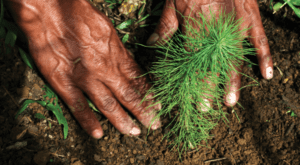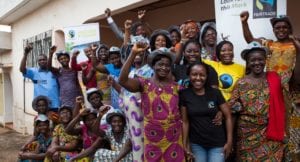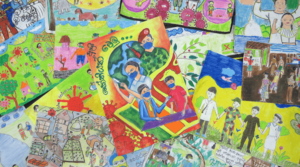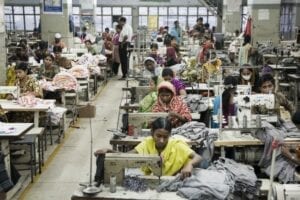- Fairtrade and Climate Justice
- Campaign for a living wage
- How the Covid pandemic increases the risk of child labour
- Who made my clothes?
To find out more about these Fairtrade issues in the news please click on the pictures to follow the links below:
Fairtrade and Climate Justice
Fairtrade farmers and workers are demanding trade that will create a sustainable future for people and planet, and using sustainable farming techniques in line with Fairtrade Standards. More here from the Fairtrade Foundation
Living wage for women cocoa farmers in West Africa
Since 2019, we have been supporting Fairtrade’s ambitious public campaign, to ask our government and the chocolate industry (worth £4billion in the UK alone) to lead the way to a sustainable future for cocoa farmers.
Our vision for living incomes is both radical and simple; we want all cocoa farmers to earn a living income from growing cocoa. A living income would provide farmers with a decent standard of living, enough to cover all their cocoa farming costs and enough to cover their basic human rights, like a nutritious diet, children’s education and healthcare. (More about it here + videos)
The living wage campaign is being extended in 2021 to producers of other crops including coffee and bananas
Child labour (impact of COVID-19)
The COVID-19 pandemic is a disaster for millions of children. School closures, coupled with limits on migrant labour, mean that boys and girls are more vulnerable to child labour. If parents become infected with the virus, children and youth, particularly girls, may end up assuming greater responsibilities for their family’s survival.
Longer term, the economic downturn will drive even more people into poverty and, as a likely result, more children into child labour. Proposals have already been made to adjust the legal requirements for young workers (age 16 and above) to cope with labour shortages in the coffee sector. It is probable that other sectors and countries will follow, reversing hard-won gains. Weaker laws and stretched government budgets will result in more child labour, especially in rural and agricultural sectors.
Find out how Fairtrade is responding to these challenges in four key ways – here
Who made my clothes?
Have you ever wondered who made your clothes? How much they’re paid, and what their lives are like?
Fashion has become a byword for exploitation, over-consumption, waste and environmental damage.
Since the Rana Plaza tragedy in April, 2013, in which a garment factory collapsed in Bangladesh, killing 1,134 and injuring 2,500 workers, millions of people have been demanding a fairer, safer, more transparent fashion industry. And brands are listening. To ensure they continue to listen and to create the permanent change needed to ensure we never see a tragedy like Rana Plaza again, people are being asked to join the Fashion Revolution and keep asking one simple question: Who Made My Clothes? You can:
- learn about Fairtrade cotton in this video (12 minutes)
- Sign Fashion Revolution’s Manifesto – here
- Get involved in Fashion Revolution Week in April – learn more
- Find out which brands offer ethically produced clothes – Fairtrade Cotton – here ; local ethical firm in Isle of Wight here ; Fairtrade cotton school clothes from Southampton firm – here
Page updated 2021-01-18



